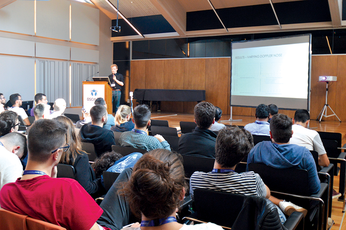Space science for everyone at the Open Source CubeSat Workshop
CubeSat Workshop

The CubeSat community gathered in Athens, Greece to explore the possibilities for open hardware and open source software in space.
The Open Source CubeSat Workshop took place at the Athens Conservatory in Athens, Greece on October 14-18, 2019 [1]. The LibreSpace Foundation [2], which is sponsored by the European Union and the European Space Agency, organized the event. The general philosophy of the LibreSpace Foundation is to remove the barriers of confidentiality and secrecy involved in satellite development and to facilitate sharing of information on how to build and operate CubeSats.
CubeSats are miniature satellites used for scientific research in space [3] [4]. The most basic CubeSat is a 10cm cube that weighs a maximum of 1.33 kilograms (2.9 pounds). The tiny CubeSat is small enough to ride along as a secondary payload on government and commercial space launches. CubeSats have also been launched from the International Space Station. In all, more than 1,100 CubeSats have been launched into space, carrying a variety of experiments – many created by university students and amateur scientists.
[...]
Buy this article as PDF
(incl. VAT)
Buy Linux Magazine
Subscribe to our Linux Newsletters
Find Linux and Open Source Jobs
Subscribe to our ADMIN Newsletters
Support Our Work
Linux Magazine content is made possible with support from readers like you. Please consider contributing when you’ve found an article to be beneficial.

News
-
Akamai Will Host kernel.org
The organization dedicated to cloud-based solutions has agreed to host kernel.org to deliver long-term stability for the development team.
-
Linux Kernel 6.14 Released
The latest Linux kernel has arrived with extra Rust support and more.
-
EndeavorOS Mercury Neo Available
A new release from the EndeavorOS team ships with Plasma 6.3 and other goodies.
-
Fedora 42 Beta Has Arrived
The Fedora Project has announced the availability of the first beta release for version 42 of the open-source distribution.
-
Dash to Panel Maintainer Quits
Charles Gagnon has stepped away as maintainer of the popular Dash to Panel Gnome extension.
-
CIQ Releases Security-Hardened Version of Rocky Linux
If you're looking for an enterprise-grade Linux distribution that is hardened for business use, there's a new version of Rocky Linux that's sure to make you and your company happy.
-
Gnome’s Dash to Panel Extension Gets a Massive Update
If you're a fan of the Gnome Dash to Panel extension, you'll be thrilled to hear that a new version has been released with a dock mode.
-
Blender App Makes it to the Big Screen
The animated film "Flow" won the Oscar for Best Animated Feature at the 97th Academy Awards held on March 2, 2025 and Blender was a part of it.
-
Linux Mint Retools the Cinnamon App Launcher
The developers of Linux Mint are working on an improved Cinnamon App Launcher with a better, more accessible UI.
-
New Linux Tool for Security Issues
Seal Security is launching a new solution to automate fixing Linux vulnerabilities.


